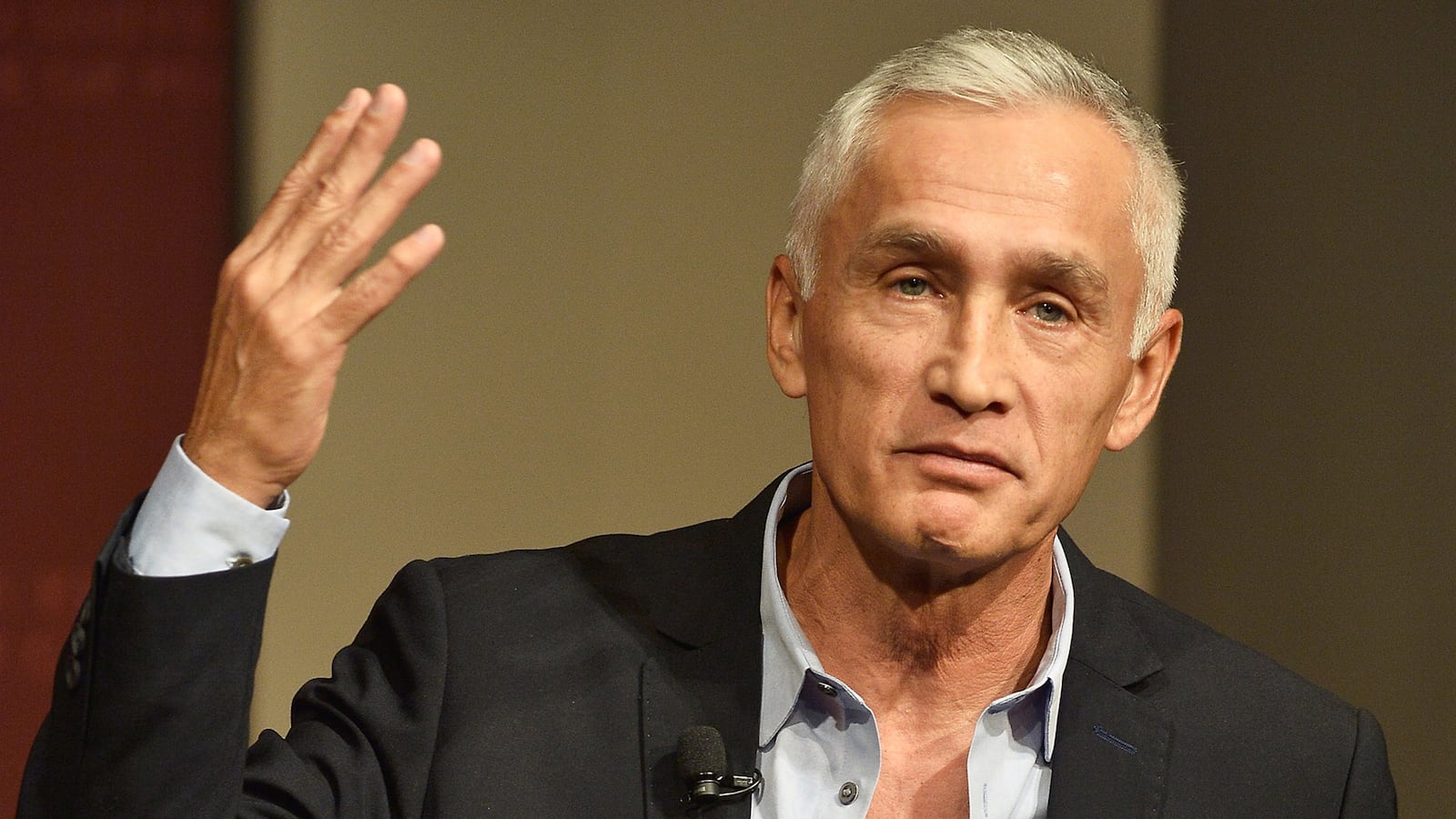What separates pro wrestling from politics? In wrestling, the grapplers talk trash before the match starts. In politics, they mostly do their trash talking after the match is over.
It’s now been more than a week since Donald Trump encountered—at what should have been a routine news conference at the Grand River Center in Dubuque, Iowa—something the billionaire real estate developer is not used to seeing: an ego as big as his own.
The healthy self-image belongs to Univision anchor Jorge Ramos, perhaps the nation’s most popular Spanish-language media figure and sometime activist.
I’m being careful not to use the “j-word.” While Ramos considers himself a journalist—apparently a weird hybrid blend of anchor, reporter, analyst and commentator—I’m not sure, given how he conducted himself at the Iowa news conference, that the newsman can still lay claim to the title.
For one thing, Ramos trampled at least a dozen rules and customs dictating how journalists are supposed to behave. Ramos was unprofessional in his demeanor and impolite to his colleagues. He made himself the story, posed arguments rather than questions, and freely expressed his own opinions.
He also played the victim when challenged, and failed to disclose at that moment a potential conflict of interest—that his daughter works for Hillary Clinton’s presidential campaign.
The mainstream media—including NBC News’s Kasie Hunt, who was in the ballroom when the Ramos/Trump collision took place—absolved Ramos of his sins, rationalizing his unprofessionalism as proof of how much he cares about the immigration issue.
Trump was surprisingly less forgiving. He doesn’t think that Ramos is much of a journalist, as he made clear the next morning on NBC’s Today Show. The newsman, Trump said, was “totally out of line” when he “stood up and started ranting and raving like a madman.”
Ramos quickly returned fire. During an appearance a few days later on ABC News’s This Week, Ramos called Trump “dangerous” and accused the GOP frontrunner of “promoting in his speeches bigotry and hatred against immigrants and Latinos.”
Both men insist that they have received nothing but positive feedback from their respective fan bases.
Team Trump thinks Ramos was acting more like an advocate than a journalist; Team Ramos thinks Trump tried to stifle criticism. If the goal was to get attention, both men came out winners. So we can expect more mutually beneficial run-ins between these two, as Trump himself seemed to imply at the end of the exchange when he told Ramos: “You and me will talk. We’re going to be talking a lot over the years.”
The Univision anchor/activist acknowledges that he flew to Iowa to confront Trump about the candidate’s immigration plan. But when Ramos jumped to his feet and started speaking, drowning out another reporter, the businessman admonished him: “Sit down, you weren’t called. Go back to Univision.” Trump then signaled one of the security guards (who also happens to be his bodyguard) to remove Ramos from the room.
And, over the newsman’s vocal objections, that’s just what happened. While Ramos waited in the hallway, a Trump supporter began arguing with him and eventually told Ramos, a U.S. citizen who was born in Mexico: “Go back to your country.”
Then, after Hunt and another reporter questioned how Trump handled the situation, the real estate developer allowed Ramos to return and ask questions. The two men bantered back and forth for the next several minutes. Before long, the conversation had run its course. That’s when Trump made his comment about how the two men would be “talking a lot over the years.”
Ironically, with his emotional hijinks, Ramos might actually have hurt his own cause. He wound up playing into every negative stereotype that Americans subscribe to about Mexicans who come uninvited across the U.S.-Mexico border. If you think Mexican immigrants are pushy rule breakers who don’t wait their turn, Ramos’s filibuster in Iowa only feeds that perception.
Now that the altercation is over with, and each participant has had the chance to spin the events, we’ve entered the final act of this telenovela.
That’s where Ramos—rather than submit to peer review—portrays himself as the only real journalist left in North America who isn’t afraid to speak truth to power. It’s where, instead of apologizing for breaking the rules, he insists that all journalists should break the rules more often. It’s where Ramos, in effect, demands amnesty for himself by arguing that he committed no sin.
It’s also in this final act that pundits and analysts are free to speculate whether Trump’s shoddy treatment of Ramos will cost the GOP frontrunner any shot he might have had to revive his support from Hispanics. A recent Gallup Poll shows Trump with a net favorability rating of minus 51 percent among Hispanics. Could Trump’s dustup with Ramos make him even more unpopular with that group of voters?
Wait and see. Personally, I don’t except many Hispanics to walk around wearing buttons that proclaim: “I am Jorge.” And take it from a Hispanic journalist who has been on the job for a quarter-century: I’m not Jorge.
How do I know? After his confrontation with Trump, as he was trying to lecture the rest of us on how to do our jobs—despite having just failed at his—Ramos said this: “I think it is very important that, as journalists, we challenge those who are in power.”
That’s rich. Ramos has never challenged President Obama, Hillary Clinton and other Democrats with the same ferocity he shows when attacking Trump and Republicans. He criticizes Trump because, he says, his deportation policies could divide families.
Where’s his constant criticism of Obama, whose deportation policies DID divide families?
Yes, as has often been noted by those who want to construct a narrative that he’s nonpartisan, during the 2012 election, Ramos did gently poke at Obama about a broken promise to push for immigration reform in his first term. But there was no shouting, no charges of promoting hatred.
Ramos has long been compromised by the fact that his employer, Univision, has such strong ties to the Obama administration and Democrats.
In 2012, just a few months before the election, the president nominated Cheryl Saban to serve as the U.S. representative to the UN General Assembly—a largely symbolic position. Cheryl is the wife of Israeli-American billionaire Haim Saban, a mega-donor to the Democratic Party who supported Clinton in 2008. He is also the owner of Univision.
In 2016, Saban is publicly backing Clinton’s bid for the presidency. Univision has partnered with the Bill, Hillary & Chelsea Clinton Foundation. And, of course, as mentioned, Ramos’s daughter works for Hillary Clinton’s presidential campaign.
Those entanglements could be why one doesn’t hear much talk on Ramos’s Sunday political show, Al Punto, about the ever-worsening scandal involving Clinton’s private email server. In the world according to Ramos, Democrats sometimes make bad decisions. But Republicans are almost always bad people.
Those on the left call that common sense. Those on the right call it slander. Neither side can call it journalism.




